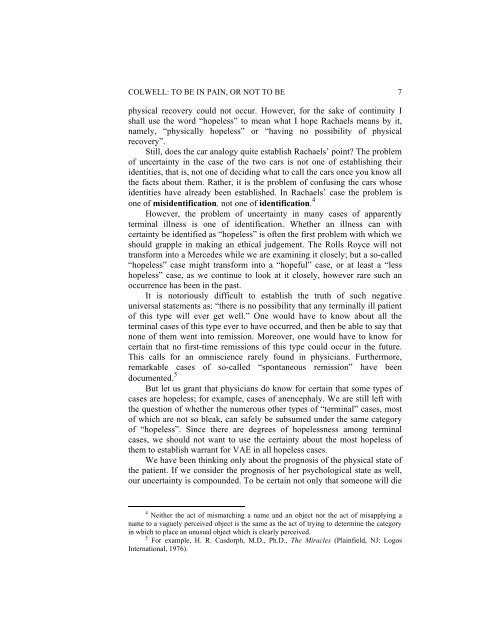LUTHERAN THEOLOGICAL REVIEW - Brock University
LUTHERAN THEOLOGICAL REVIEW - Brock University
LUTHERAN THEOLOGICAL REVIEW - Brock University
Create successful ePaper yourself
Turn your PDF publications into a flip-book with our unique Google optimized e-Paper software.
COLWELL: TO BE IN PAIN, OR NOT TO BE 7<br />
physical recovery could not occur. However, for the sake of continuity I<br />
shall use the word “hopeless” to mean what I hope Rachaels means by it,<br />
namely, “physically hopeless” or “having no possibility of physical<br />
recovery”.<br />
Still, does the car analogy quite establish Rachaels’ point The problem<br />
of uncertainty in the case of the two cars is not one of establishing their<br />
identities, that is, not one of deciding what to call the cars once you know all<br />
the facts about them. Rather, it is the problem of confusing the cars whose<br />
identities have already been established. In Rachaels’ case the problem is<br />
one of misidentification, not one of identification. 4<br />
However, the problem of uncertainty in many cases of apparently<br />
terminal illness is one of identification. Whether an illness can with<br />
certainty be identified as “hopeless” is often the first problem with which we<br />
should grapple in making an ethical judgement. The Rolls Royce will not<br />
transform into a Mercedes while we are examining it closely; but a so-called<br />
“hopeless” case might transform into a “hopeful” case, or at least a “less<br />
hopeless” case, as we continue to look at it closely, however rare such an<br />
occurrence has been in the past.<br />
It is notoriously difficult to establish the truth of such negative<br />
universal statements as: “there is no possibility that any terminally ill patient<br />
of this type will ever get well.” One would have to know about all the<br />
terminal cases of this type ever to have occurred, and then be able to say that<br />
none of them went into remission. Moreover, one would have to know for<br />
certain that no first-time remissions of this type could occur in the future.<br />
This calls for an omniscience rarely found in physicians. Furthermore,<br />
remarkable cases of so-called “spontaneous remission” have been<br />
documented. 5<br />
But let us grant that physicians do know for certain that some types of<br />
cases are hopeless; for example, cases of anencephaly. We are still left with<br />
the question of whether the numerous other types of “terminal” cases, most<br />
of which are not so bleak, can safely be subsumed under the same category<br />
of “hopeless”. Since there are degrees of hopelessness among terminal<br />
cases, we should not want to use the certainty about the most hopeless of<br />
them to establish warrant for VAE in all hopeless cases.<br />
We have been thinking only about the prognosis of the physical state of<br />
the patient. If we consider the prognosis of her psychological state as well,<br />
our uncertainty is compounded. To be certain not only that someone will die<br />
4 Neither the act of mismatching a name and an object nor the act of misapplying a<br />
name to a vaguely perceived object is the same as the act of trying to determine the category<br />
in which to place an unusual object which is clearly perceived.<br />
5 For example, H. R. Casdorph, M.D., Ph.D., The Miracles (Plainfield, NJ: Logos<br />
International, 1976).













